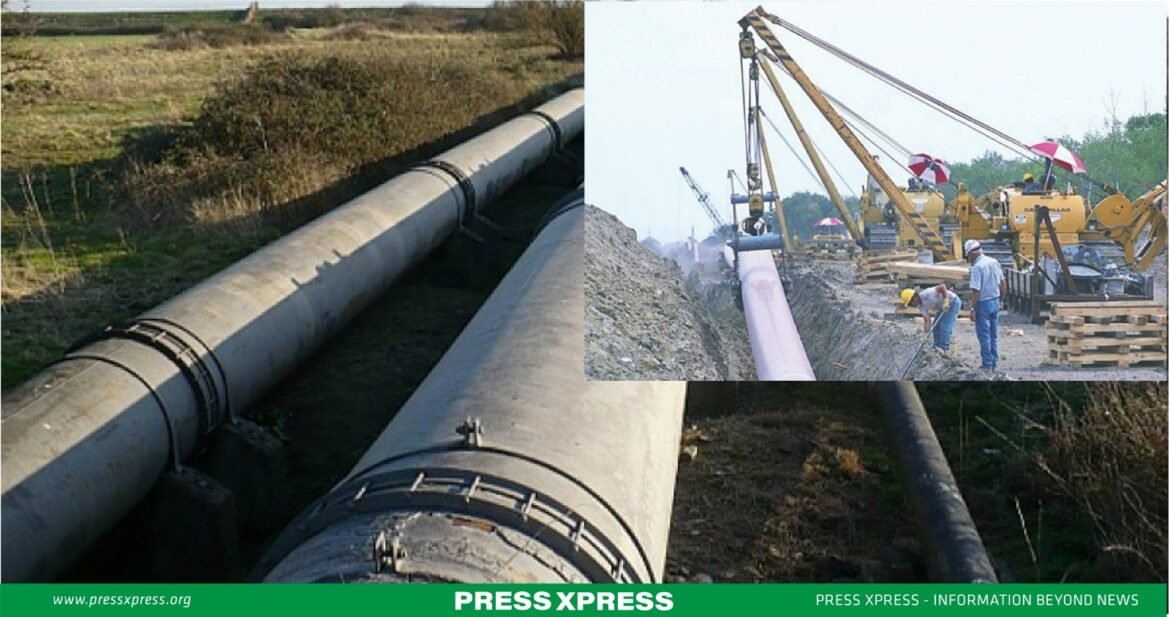Notably, the Chattogram-Dhaka Oil pipeline traverses beneath the beds of 22 rivers from Patenga to Fatulla
A noteworthy milestone has been achieved in the Chattogram-Dhaka Oil pipeline project. Seventy percent of the pipeline installation work originating from Chittagong has been successfully completed, with the objective of ensuring an uninterrupted supply of fuel oil to Dhaka. Project officials anticipate the initiation of oil delivery to Dhaka through this pipeline by December of the upcoming year (2024).
You can also read: Maitree Pipeline Strengthens Indo-Bangla Energy Cooperation
Traditionally, fuel oil is transported from Chattogram to Dhaka via both river and road routes. However, this mode of transportation is susceptible to disruptions, particularly during periods of political unrest. Furthermore, the expenses associated with river and road transport are substantial, coupled with allegations of oil theft. Additionally, challenges arise during the dry season when reduced navigability hampers oil transportation.
In response to these challenges, the Executive Committee of the National Economic Council (ECNEC) approved the ‘Energy Oil Transport by Pipeline from Chattogram to Dhaka’ project in October 2018, allocating a budget of Tk 2,861 crore 31lakh. As part of this initiative, a 250 km pipeline is under construction, spanning from Patenga in Chattogram to Narayanganj Fatulla.

BPC’s Decades-Long Vision
The Bangladesh Petroleum Corporation (BPC) is currently engaged in the implementation of a pipeline project designed for the transportation of fuel oil. According to reputable sources within the organization, the initiative to establish this pipeline was first undertaken in 1999 as a strategic response to the energy transportation crisis. During this period, there was a proposed plan to construct a pipeline connecting Chattogram to Gazipur. However, owing to a myriad of complications, the execution of this particular project did not come to fruition.
Subsequently, in 2015, during the governance of the incumbent administration, the concept of the Chattogram-Dhaka Oil pipeline was revisited with a renewed emphasis. A comprehensive feasibility assessment was conducted to scrutinize the viability of the project. Finally, in 2018, the project secured formal approval from ECNEC.
Commencing in 2018, the anticipated completion of this project by December 2022 has not been realized, with work still ongoing. The two-phase extension has incurred an additional cost of around 800 crore taka, bringing the total expenditure to 3,600 crore taka. Concurrently, the project’s timeline has been extended to December 2024. Project Director Engineer Aminul Haque attributes the cost escalation to the Russia-Ukraine war and the domestic dollar crisis. Complications, including challenges in land acquisition, further impeded the project’s timely completion, necessitating the extension until December of the following year.
Current status of Chattogram-Dhaka Oil pipeline project
The project stakeholders have indicated that the 24 Engineering Construction Brigade of the Army is overseeing the construction efforts. The pipeline’s route spans from Patenga Guptakhal in Chattogram to Godnail in Narayanganj, passing through Feni, Comilla, Chandpur, and Munshiganj.
Presently, the pipeline measures 241.28 km in length, with a diameter of 16 inches for the underground sections from Patenga to Godnail. Additionally, an 8.29 km pipeline is in progress from Godnail to Fatulla in Narayanganj, featuring a 10-inch diameter. Notably, the pipeline traverses beneath the beds of 22 rivers from Patenga to Fatulla.
As of now, 232 km of the total 250 km pipeline has been successfully laid, leaving 18 km pending in the Chittagong and Feni sections. Furthermore, substantial progress has been achieved, with 80 percent completion of the construction for 9 stations and ongoing efforts to install 4 pump houses. Additionally, a new depot with a 21-thousand-ton capacity is under development in Barura, Comilla. Overall, the project has reached a 70 percent completion milestone.
Officials affirm that upon pipeline installation, an annual transportation capacity of 27 to 30 million tons of fuel oil will be realized, with potential for expansion to 50 million tons in subsequent phases. Project Director Engineer Aminul Haque anticipates the transportation of oil to Dhaka through the pipeline by December (2024).
Efficiency and Traffic Relief
The completion of the Chattogram-Dhaka Oil pipeline construction holds promises beyond increased capacity. It is expected to streamline the time taken to supply oil to end-users, bypassing traffic congestions, accidents, and other unforeseen bottlenecks such as natural disasters and strikes. Currently, Dhaka and its adjacent areas consume nearly two million tonnes of oil annually, relying on various modes of transportation, including coastal tankers, railway wagons, and tank lorries.
In conclusion, these pipelines represent not only crucial advancements in Bangladesh’s energy infrastructure but also underscore the nation’s commitment to efficient, secure, and collaborative energy solutions. As these projects near completion, they are expected to usher in a new era of streamlined energy logistics and strengthened regional partnerships.


